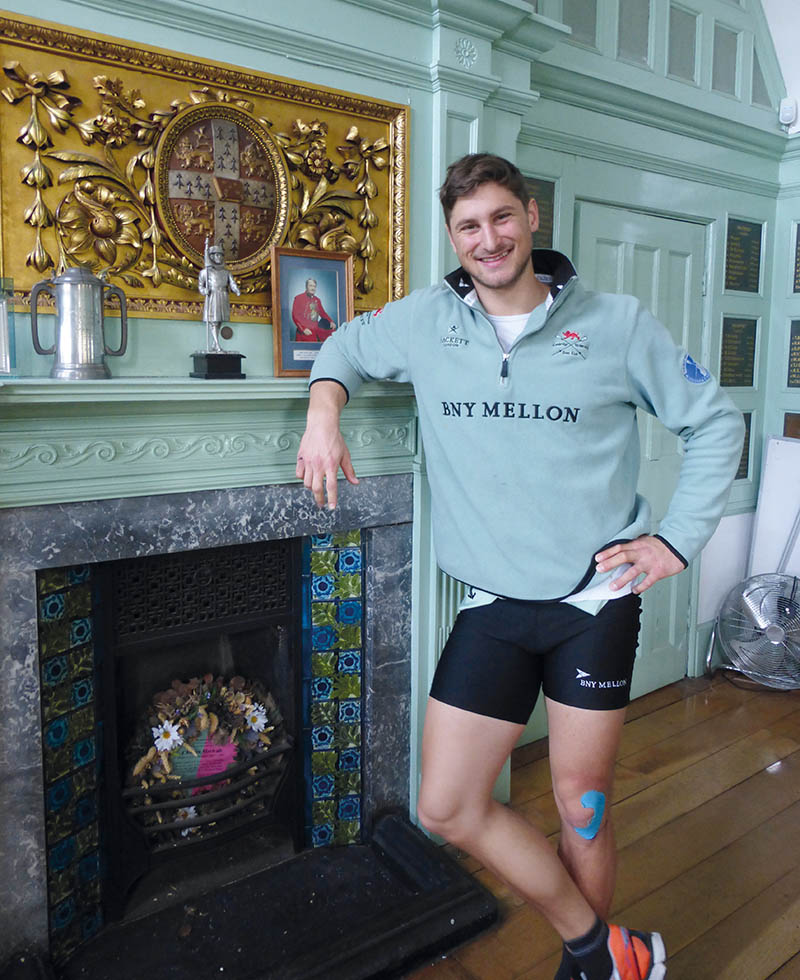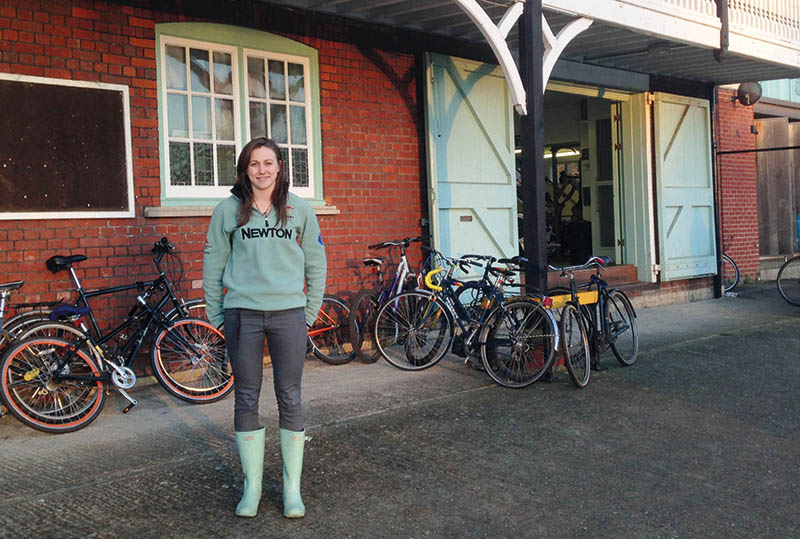Caroline Reid, CUWBC President
Q: This is the first year the men and women will race the same course on the Thames on the same day. What does this mean for women’s rowing, and for sport more widely?
A: It’s a very exciting step for women’s rowing. It’ll open up our race to a wider audience and hopefully encourage more women to give rowing a go. It’s great that rowing is moving in the same direction as many other sports, be that the equal prize money for men and women at Wimbledon, or the England women’s football team playing at Wembley for the first time. It’s a progressive time for women’s sport and I hope that we can spur other sports to follow in our footsteps.
Q: How did you get into rowing?
A: Having previously kayaked, I knew that I wanted to give rowing a try when I came to Cambridge. I went down to my college boat house in freshers’ week where I won a bottle of Prosecco for the fastest female erg [rowing machine] test on the day and I haven’t looked back since. Although, sadly, I don’t get bottles of Prosecco for my ergs any more!
Q: What does it take to be a rower of this standard?
A: A huge amount of determination and willpower. You have to be very dedicated to do the training and continually push yourself to your limits. Having patient and understanding family and friends also helps.
My alarm goes off at 5:15am… It’s a long and intense day and you’re definitely ready for your bed by the end of it!
Q: Tell us about your training regime…
A: My alarm goes off at 5:15am in time for me to cycle to the station to get the train to Ely, where we do our morning water-training for about an hour and a half. Then we get the train back for our 9am lectures. In the evening, it’s time for our second session of the day, this time at the Goldie boathouse in Cambridge. We’ll do some weights or an erg session for about 90 minutes. It’s a long and intense day and you’re definitely ready for your bed by the end of it!
Q: Do you ever feel you’re missing out on the typical student life?
A: I feel very lucky to have had so many amazing experiences rowing for the University. I wouldn’t change that for a few more nights out and hungover lectures.
Q: What’s the camaraderie like in the club?
A: It’s amazing. I’m lucky to be president of such a friendly, supportive and driven group of athletes. The early mornings curtail the big drinking sessions, but there are lots of other social activities, like club dinners, sushi-making nights, etc.
Q: You’ve rowed the Boat Race before. What’s it’s like to line up at the start?
A: Lining up on the start isn’t the most nerve-wracking part. Once you’re there you know exactly what to do: you’re focused and in your own bubble. Waiting beforehand is worse, when you’re counting down until it’s time to race.
Q: Finally, tell us something surprising about Cambridge University Women’s Boat Club.
A: The combined weight of our crew is similar to that of a Bactrian camel.

Alexander Leichter, CUBC President
Q: First things first: how tall are you?
A: I’m 6′ 4″, which is not outrageously tall for a rower. Our tallest is Clements, a fellow Austrian, who’s 6′ 8″. It helps to be tall because you have a longer reach and the angles are easier – it’s just biomechanics. But I’ve seen many very tall people row really poorly, and vice versa.
Q: How’re you feeling about this year’s race?
A: Confident. We have a mentally strong crew with really strong cohesion. On paper, I think Oxford are the favourites: they have more internationally experienced rowers so it won’t be easy, but I think we can beat them. It’s always a very close margin. The race is 16-18 minutes long and crews win by no more than a couple of seconds.
To lose really hurts. There is no second or third place: it’s all or nothing. And you want to win not just for your sake but for everyone who’s done it before you. This race is 180 years old and you want to leave a legacy, which is why we put so much effort in.
Q: How much rivalry is there between you and the Oxford crew?
A: We see them nearly every time we go to London because our boathouse is next to theirs. It can be a bit awkward, and there is tension there, but I wouldn’t go as far as saying it’s really rough rivalry. We respect each other because, as much as we are opponents, they are the people we’re closest to; we’re all going through exactly the same thing.
Q: Where were you in 2012 when protester Trenton Oldfield interrupted the race?
A: I was watching the race on TV in Austria. I wasn’t at CUBC then but I knew I’d be at Cambridge the following academic year. I was as confused as everyone, and I knew it was very rare for the boat race to be stopped. It was unfortunate, knowing how much those guys had put into it. We won, and we deserved that win, but I think there will always be an asterisk beside it.
Q: Tell us how you got here and what it takes to be a rower at this level?
A: I started rowing in 2005, then came here in 2012 and raced in the reserve crew for my first two years. So I haven’t raced in the main crew before. Physically it’s a very demanding sport. Many people have described rowing as a pain contest. You push your body until it shuts down, basically. I’ve had moments during land training when I’ve gone unconscious. It requires mental as well as physical strength – to not just tell yourself you can do this but know that you can do it.
Q: How do you juggle your rowing with your studies?
A: I’m in my final year studying land economy, so I’m trying to finish my dissertation while I’m training. I think sometimes people don’t realise that all our guys are top academics. People think that rowing compromises that, but, in fact, statistically everyone here is above the university average. The sport teaches you discipline and time management, and we are inherently very competitive people.
Q: Finally, why do you do it?
A: For the love of the sport of rowing, for the challenge and for the friendships you make here, which can last for a lifetime. And it’s an amazing piece of history to be part of.
The Oxford-Cambridge Boat Races take place at 4.50pm (women’s race) and 5.50pm (men’s race) on 11 April.
MORE LIKE THIS:
:: Crews announced for The Boat Races 2015 – plus the race in numbers
:: Don’t miss the Oxford-Cambridge Goat Race (yep, we said goat…)

